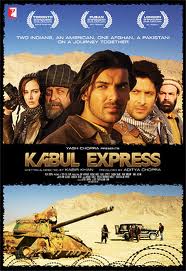
KABUL EXPRESS
India, 2006, 105 minutes, Colour.
John Abraham, Arshad Warsi, Salman Shahid, Linda Asenio.
Directed by Kabir Khan.
Interesting to see this adventure set in Afghanistan with an Indian audience who chuckled a lot at the dialogue and the references. They really enjoyed it, especially with Indian model and star, John Abraham, hero of several big Bollywood movies, at the centre.
This is India cinema being more serious than usual, though it is interesting to compare how several Iranian directors (especially the Makhmalbaf family films, Kandahar and At Five in the Afternoon) have made films about recent events in Afghanistan. The Iranians, neighbours to Afghanistan, are very serious with a tradition of documentary and exploring issues in depth
The Indians are also serious but there is a certain light-hearted treatment even in perilous situations. John Abraham and Arshad Warsi are two ingenuous TV journalists who turn up hoping for a story and get more than they bargained for. Encountering the Taliban (it is November 2001), they are dismayed at the violence, bloodshed and repression. When they are abducted by a Taliban Pakistani who wants to go home, they begin a road journey that gives them a more realistic picture of life in the mountains and the desert. They are joined by an American photographer which gives the opportunity for comments about American attitudes, foreign policy and the bombings.
In fact, the politics of the area are explored, the Taliban, the Mujahadin, the war lords, the Pakistanis, the aftermath of the Russians and the Americans.
The location photography is magnificent. Audiences will feel that they have travelled through the country.
The film is ultimately on the side of humanity, reconciliation and peace. The journalists get to know their captor and find that he has a story, that he is not simply a fanatic or an ideologist.
Not as fine-tuned as glossily-crafted as bigger budget films but it offers audiences familiar with the countries and the wars from the media a chance to give more thought to the issues.
1. The film made in the years after 9/11 and the war in Afghanistan? The title?
2. An Indian film, perspectives on Afghanistan, on Pakistan? On the Taliban? On the American presence in Afghanistan?
3. The photography, the beauty of the locations, mountains, deserts, the road from Afghanistan to Pakistan? The musical score?
4. The focus on the journalists, their personalities, characters, not being briefed, going on the track, road journey, looking for a story? Their interactions
with each other?
5. The Taliban Pakistani, his character, his experience, Taliban attitudes, wanting to go home? Meeting the journalists, interactions with them, partly abducting them, partly freedom? His own understanding of the Taliban, having to change as he goes home? His transformation?
6. The American journalist, joining the group, her presence, interactions, with the Pakistani, with the journalists? The opportunity for many discussions about American attitudes, towards Asia, towards Pakistan, towards Afghanistan, the Taliban? The presence in Asia after 9/11, the conflict in Afghanistan? The perspectives on the US, critique of the US?
7. The background of Afghanistan, the Russian occupation, the Mujahadin, the Americans supporting them against the Russians, the emergence of the Taliban, the alleged sheltering of Osama bin laden, revenge and retaliation?
8. The Pakistani and the journey home, changes?
9. The audience, sharing the journey, Indian perspectives, worldwide perspectives, better understanding, the critique of the challenge?